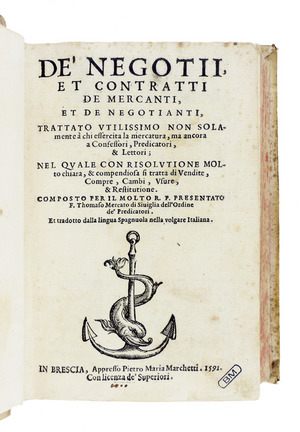Tomás de Mercado facts for kids
Tomás de Mercado (born around 1525 – died 1575) was a Spanish Dominican friar. He was also a smart thinker who studied both economics and theology. He is most famous for his important book, Summa de Tratos y Contratos, which means "Manual of Deals and Contracts." This book was published in 1571.
Tomás de Mercado, along with another thinker named Martín de Azpilcueta, helped start an economic idea called "Iberian monetarism." Both of them were part of a group of smart people known as "Late Scholasticism" or the School of Salamanca.
Mercado might have been born in Seville, Spain, or perhaps in Mexico. He joined the Dominicans when he was young. He taught arts in Mexico City before going back to Spain. He studied at Salamanca University, where he later taught philosophy, moral theology, and law. He also worked at the Exchange House in Seville, which was a big center for money moving around the world. Sadly, he died at sea while traveling back to Mexico.
Tomás de Mercado became more widely known after a famous economist named Joseph Schumpeter wrote about him. This was in Schumpeter's book, History of Economic Analysis, published in 1954. Since then, more people have become interested in Mercado's ideas, especially as monetarist economics became popular again.
Contents
Mercado's Famous Book: Summa
Tomás de Mercado's book, Summa de Tratos y Contratos, was a bigger version of an earlier work. That first book was published in 1569. The Summa was written for both business people and scholars. It also talked about many social issues of the time.
Mercado expanded on ideas from Martín de Azpilcueta. Azpilcueta was the first to connect the "price revolution" in Spain to the huge amount of gold coming from the Americas. Mercado explained how this worked. He noted that: "High prices hurt Spain. These prices made Asian goods very attractive. Silver money then flowed out of Spain to pay for them. The streets of Manila in the Spanish Philippines could be paved with granite stones from China. These stones came as extra weight in Chinese ships that were coming to get silver for China."
Fair Prices and Government Rules
Mercado thought a lot about the idea of a "just price," which means a fair price. He looked at this idea using wheat as an example. He strongly believed that the government should set a fixed price, called a tasa. He felt this was important for social and ethical reasons. He supported this even if it meant that people selling goods might lose money.
Mercado and the Slave Trade
Tomás de Mercado wrote a chapter about the African slave trade. He was very critical of it. He clearly saw that the idea of "just enslavement" did not match how the actual trade worked. However, he thought it was okay for Europeans to buy people who had already been enslaved by Africans. He also accepted the enslavement of people captured in war, those punished for crimes, or children sold by their parents because of great need.
See also
 In Spanish: Tomás de Mercado para niños
In Spanish: Tomás de Mercado para niños
 | Shirley Ann Jackson |
 | Garett Morgan |
 | J. Ernest Wilkins Jr. |
 | Elijah McCoy |


